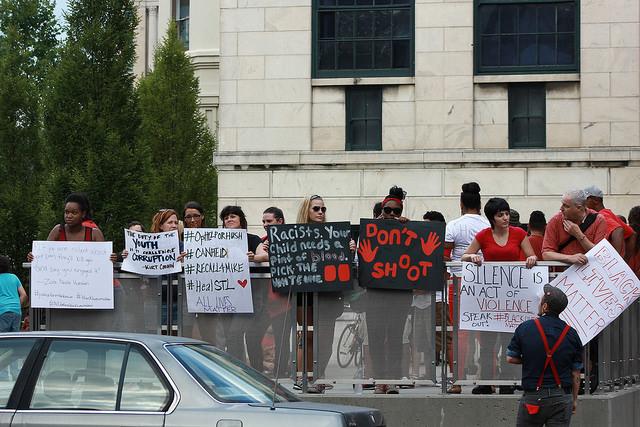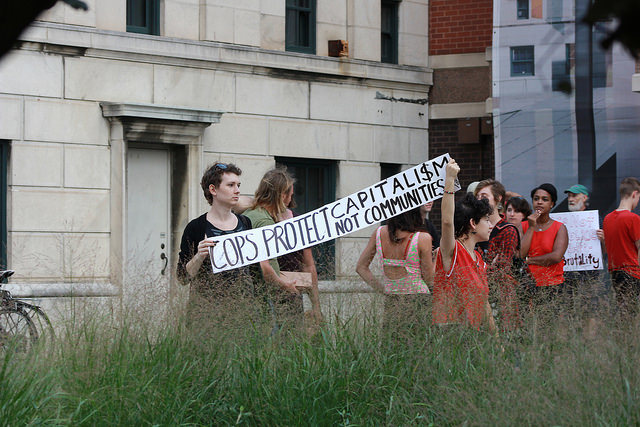
Photo by Brian Vu – Photography Editor
Government must defend the right of free press
By Grace Raper – Editor-in-Chief – [email protected] | Aug. 27, 2014 |
As tensions in Ferguson, Missouri reached a boiling point, much of the United States remained uninformed of the death of an unarmed black teenager at the hands of a police officer. The collective eyes of a nation only turned toward the unjust actions taking place within its own borders after camera crews ran from tear gas, with their equipment dismantled and rights violated.
The lack of information stemming from conflicts in Ferguson during the first days of protests hardly represented a new trend in media coverage. The few journalists on the ground found themselves reporting on a topic, which would challenge the very foundation of their First Amendment rights. These reporters deserve thanks for their tenacity and ability to make their voice heard where so many others didn’t even bother trying.
Freedom of the press in the United States keeps police forces like those in Ferguson from barring the truth from the public. Renowned political commentator Walter Lippmann once wrote regarding the barrier of public from an event, “Without some form of censorship, propaganda in the strict sense of the word is impossible.” The truth in this statement remains relevant as ever in an age where police forces erect barricades and form “press approved areas.”
However, the lack of condemnation from President Obama regarding the violation of First Amendment rights of the press, at best, shows a poor attempt to maintain approval ratings and at worst could be misconstrued as consent for what media professionals experienced in Ferguson.
Without the efforts of individuals such as Ryan J. Reilly, Alice Speri and Wesley Lowery, among others, the brutality exhibited by the police in Ferguson might have never gained such widespread coverage. This shows the role of the press at its most necessary: to collect facts through evidence and honestly disseminate those facts to the public.
The role of Twitter in the coverage of the people in Ferguson indicates the new trend in journalism to connect citizens and their reporters without the indirect channels of editors and publishing deadlines. Retweeting on-the-ground eyewitness events in relation to both police and protesters opened opportunities to gather more evidence than conceivably possible with only one news team.
Live footage streaming on social media allowed for events to be transmitted with as much transparency possible. No editing, no commentary — just the raw picture of Ferguson. Where many larger media entities, such as CNN, Fox or MSNBC, chose to examine the issue of looting or found themselves caught up in the hysteria, other avenues of reporting existed largely due to social media.
Vox, VICE and The Washington Post showed the rare sides of a situation such as in Ferguson. Long after the media vacate and the police are or aren’t held accountable for their actions, the people of Ferguson will find themselves left to clean up after the wreckage. NPR highlighted stories of the lives of those who just wanted to sleep a full night or go to school in the morning.
These sources managed to hold the perspective that those people seen holding up their hands in protest, engulfed in tear gas and unfairly placed in handcuffs are human beings. They do not only exist in photographs or sensationalized stories — they feel, think and struggle.
Michael Brown may have been the igniting element in the conflicts now unfolding, but at the end of the day, he represents the target of injustice in a nation full of people, who largely claim “colorblindness” to avoid the truth.
Reporters in Ferguson helped expose that truth, which exists behind all the protests and anger: Until we acknowledge the injustices faced by minorities in this country at the hands of those we task with protecting us and hold those perpetrating such acts accountable, these unnecessary violations of rights and dignities will never end.
Journalists must exercise correct ethics in reporting
A.V. Sherk – News Editor – [email protected]
The violent conflict in Ferguson, Missouri became a whirlwind of chaos within two weeks; however, the contributions to the turmoil resulted from both inappropriate force and media coverage in equal measure.
With the introduction of social media and the resources of major broadcast companies, modern journalism shifted into a contest of timeliness. Social media both enabled any person to post live feed and diminished the need to follow professional journalists. Yet, these people aren’t journalists. They don’t fact check, they don’t edit and they aren’t held accountable when they they get their stories wrong.
The twitter feed of @OpFerguson, an extension of the hacktivist group Anonymous, demanded the St. Louis chief of police post the name of the officer who shot and killed Michael Brown. If the name was not released, they threatened to then post the name themselves. The name they posted was wrong. If the more violent dissidents, full of righteous fury at the unjust murder of an unarmed teenager, had gotten ahold of that officer and his family, who knows what would have happened.
It isn’t just shortsighted individuals with a Twitter who muddle the facts and obscure the truth. Ferguson became an overnight media blitz, obscuring the true tragedy at the center. Major broadcast channels such as CNN and Fox News chose to focus on the looting and the radicals rather than the violence and dishonesty of the authorities which inspired the lawlessness. It’s what they aren’t reporting which matters most.

Photo by Brian Vu – Photography Editor
All Americans should be shocked and outraged when those meant to serve and protect arrests truth-seeking journalists, that’s what turned the collective gaze of the public. That’s not the real issue here. A teenager was shot, killed and left in the street for hours with no emergency services called. Brown’s murderer’s identity and whereabouts are known, but he remains at large.
Three weeks later, the officer who shot and killed Mike Brown remains uncharged. As of this moment, Darren Wilson remains on paid administrative leave with 66,000 likes on his “Support Darren Wilson” Facebook page and a GoFundMe site of nearly a quarter of a million dollars for his relocation, expenses and defense.
The people who support Wilson blame the media and say it only tells one side of the story. Wilson’s supporters claim they’re tired of “living in fear of speaking out,” according to a press conference held in St. Louis and aired on CNN. Supporters went on to chastise journalists for broadcasting in front of the homes of people and attempting to interview family members.
Honestly, if the media isn’t sounding favorable to the supporters of Wilson, then they probably have it right. There is no way to objectively examine the facts of Brown’s death and find a silver lining for Wilson.
It seems people aren’t sure what to expect of mass media anymore. Raw footage posted to Twitter became essential to the horrors of Ferguson gaining traction and at the same time, potentially threatened an innocent man and his family.
Ferguson is a wake-up call for mass media. Both large-scale broadcast networks as well as print and e-journalists need to rise to the occasion and hold their publications to transparent standards or lose their audience forever to an army of hipster radicals and their smartphones.
Downplaying the importance of the First Amendment or the right of free speech is not the issue. Keeping the public informed is the task of media professionals. We research, interview and fact check so the public may weight the major issues and hold their government responsible. We’re essential to the democracy of this country. We are the Fourth Estate.
However, with this right comes certain responsibilities.
Journalists have a code of ethics and should always strive act in way which would reflect on the profession with respect to the issues covered. Without dignity and personal standards, journalism quickly becomes sensationalism.


![Brooke Pedersen [second from the right] and Luis Reyes [right] hold banners during the Wrap The Woods event.](https://thebluebanner.net/wp-content/uploads/2025/09/ELIZABETH_PRITCHITT_IMG_3470-1200x804.jpg)
















